Ladies and gentlemen, we are witnessing the most anticipated match in the history of smartphones for the heavyweight championship of the world. Are you ready? For those watching around the world, let's get ready to rumble!
For this battle, we're comparing the four heavyweights: Android, BlackBerry, iOS, and Windows Phone 7. Symbian is on the fast track to extinction, and WebOS (found on Palm and some HP devices) is a minor player.
Gladiators, Step Forth
Android: They say it takes a village to raise a child, and Android is a great example. It's parented not only by Google but also by the members of the Open Handset Alliance, many of whom are among the biggest, baddest companies in the world. It's no wonder that this puppy is tearing through everyone else's market share. Android first appeared on a phone in October 2008.
BlackBerry: The veteran of the four, the BlackBerry OS hails from Research in Motion. When they debuted in 1999, BlackBerry devices were little e-mail machines, and that was pretty much it. Now running on OS version 6, with 7 on the horizon, they can do a lot more.
iOS: The first iPhone was born in June 2007 to Apple. What was then known as "iPhone OS" in 2010 changed its name to iOS to incorporate the iPad, iPod Touch, and Apple TV. Coveted by yuppies, hipsters, and pretty much everyone else, iOS looks tough to beat.
Read more other news : hp 484170-001 battery
Read more other news : hp 484170-001 battery
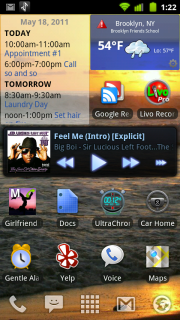
Full of widgets, apps, and shortcuts, this is an example of extreme customization on Android. Windows Phone 7 (WP7): The rookie. The successor to Windows Mobile OS (and Symbian's usurper), Windows Phone 7 is Microsoft's newborn, first appearing in November 2010. Windows Phone 7 was a major shift in focus from the business world to the consumer world, and Microsoft temporarily dropped support for many business features to get this first iteration out. Adoption has been slow, but now that Microsoft has partnered with Nokia, some analysts are predicting a growth spurt. As one might expect from the youngest OS, many features are still missing, but a number of those omissions should be addressed in this fall's "Mango" update.
Now, contenders, return to your corners and come out swinging!
The Battles
Apps:
Apple's App Store has the most apps available for a phone (nearly 380,000), but soon it will be overtaken by the Android Market (about 300,000), perhaps this summer. Android has already overtaken iOS in the number of free apps. BlackBerry App World hovers somewhere around 30,000 apps, but it is expected that before turning a year old, the Windows Phone 7 Marketplace (currently about 18,000 apps) will surpass it later this year.
The quality of the apps is the subject of much debate, but such a huge number of app developers are publishing across multiple platforms that the argument is becoming somewhat irrelevant. In general, iOS often gets its edition of most apps first, and the apps tend to be more polished when they first launch. Android equivalents catch up quickly, and sometimes even offer more functionality (such as better sharing options and deeper access to the phone's resources).
Windows Phone 7 apps work best when they try to match the aesthetics and flow of that interface, but otherwise tend to fall on their faces. Windows Phone 7 is still young, though, and many of these kinks should be worked out over time. Third-party apps can't multitask at this point, and they don't feel deeply integrated; however, such shortcomings will be fixed with Mango.
Against the other mobile OSs, BlackBerry apps generally feel like 8-bit Nintendo games next to a Playstation or Xbox. Both quality and selection are sorely lacking, and the even best BlackBerry apps are generally less user-friendly than their counterparts on other platforms.
Apps Winner: iOS gets the win here, with Android close behind.
Productivity and Business Apps:
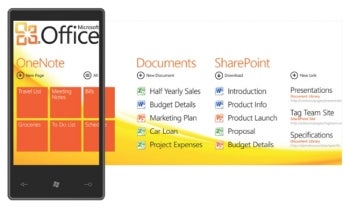
Windows Phone 7’s Office Hub, a beast of a productivity suite.The vast majority of U.S. businesses work in Outlook, Word, Excel, and PowerPoint, as well as with Microsoft Exchange (a server for e-mail, calendar, contacts, and tasks). Microsoft Office Mobile on Windows Phone 7 has all that and more. Office files are easy to work with, and can be synced using SharePoint.
Some businesses have made the leap from Microsoft products to those made by Google--such as Apps for Business, Docs, Calendar, and Gmail--and it's a safe bet that more will soon make the jump, with cheap Chromebooks on the way.No other mobile OS integrates as fully with Google products as Android does--it's the only platform with a native Google Docs app. Its Exchange integration is also good. For working with Microsoft documents, third-party Android apps are available.
Apple's excellent iOS productivity suite, iWork, is now available for the iPhone. The App Store is also packed with third-party productivity apps, which range from fantastic to terrible. Exchange integration in iOS is decent. Android and iOS 4, by the way, both allow their devices to be used as Wi-Fi hotspots, which can be a life-saver.
BlackBerry is also relegated to third-party apps for dealing with Office files--including Documents to Go. Blackberry App World is relatively miniscule, though there are gems, such as RIM's BlackBerry Mobile Conferencing. That said, BlackBerry's Exchange integration is second to none--if your business is running BlackBerry Exchange Server (BES). BlackBerry Internet Service (BIS)--the server that's more for consumers--will sync e-mail but not contacts, calendars, tasks, or notes. The other OSs do this without making you pay (BES is about $15 a month more than BIS).
Productivity and Business Apps Winner: Windows Phone 7 wins, thanks to Microsoft Office Mobile.
Read more other business news : dell d630 battery
Read more other business news : dell d630 battery
E-mail:
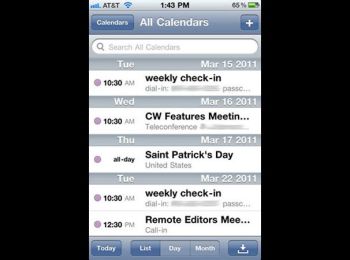
A condensed view of iOS’s calendar in List mode.BlackBerry e-mail is fast and reliable; plus, it can funnel all of your accounts--and your SMS and BlackBerry Messenger messages--within a single inbox. E-mail on the other three operating systems looks cleaner, but I'll take functionality first.
Android and iOS offer integrated inboxes that combine multiple accounts, whereas Windows Phone 7 keeps them separate (again, this will change with Mango). Interestingly, on Android your Gmail account gets its own app rather than being integrated into the single mailbox.
E-mail Winner: E-mail on any OS works well with Exchange, but BlackBerry wins.
Calendar:
Windows Phone 7 has the best-looking calendar tool of any mobile OS, and it can sync with multiple calendars from different sources. It's not without limitations, however. For example, it can sync only with your main Google calendar.
Android and iOS have straightforward, easy-to-read calendars. They aren't as pretty as Windows Phone 7's, but they can handle virtually all of the same tasks, as well as multiple Google calendars. Naturally, Android handles Google Calendar better than the rest, but iOS is almost as good (though you may have to go through a few extra steps to use multiple calendars).
BlackBerry's calendar does most of what the others do, but it doesn't look as good. It has trouble with multiple Google calendars, and if you want it to sync with Exchange you need BES, as BIS can sync only e-mail. This should change to serve the consumer market.
Calendar Winner: Windows Phone 7 edges out Android and iOS.
Contacts:
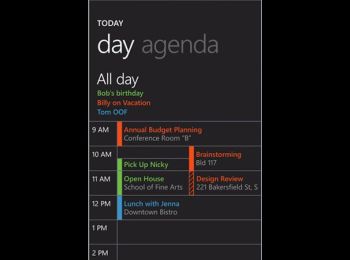
Windows Phone 7’s gorgeous calendar is way easier on the eyes than the rest.All four operating systems deal with contacts fairly well, supporting multiple Exchange accounts and allowing you to integrate contacts from different Exchange accounts. But again, with BlackBerry, you can wirelessly sync contacts only if you're on a BES server or use third-party software.
Contacts Winner: Android gets the nod for merging contacts wirelessly from multiple e-mail accounts and Exchange accounts, as well as Facebook and Twitter. If you already rely on Gmail, though, Android is a clear winner.
Remote Control and VNC Options:
VNC stands for Virtual Network Computing. It means, essentially, the capability to control a computer remotely, via the Internet, from another computer or mobile device. It's handy in a pinch, less so on devices with smaller screens and slower processsors. Android and iOS have the most and the best VNC options, with LogMeIn Ignition at the forefront. For Windows Phone 7, Remote Desktop is the most popular. BlackBerry falls behind; the few VNC clients built for it have low user ratings. The most popular is VNC Plus, but don't expect too much if you're using devices with smaller screens and slower processors.
Remote Control and VNC Winner: Android and iOS tie.
Keyboards:
iOS had the first great touchscreen keyboard. It's generally responsive and accurate, and text correction works well. The first time I saw the software keyboard on Windows Phone 7, I thought there was no way I could type on its tiny "buttons." Yet somehow, my typing was quick and accurate. Its text prediction and autocorrect are good, but better key visibility would be nice.
One big reason to buy a BlackBerry phone is for its hardware keyboard. Touchscreen keyboards on BlackBerrys, however, are nothing to write home about.
The native keyboard standard in Android is decent, but the option to install third-party keyboards is great. Options include the sliding keyboards Swype or SlideIT, and the almost spooky text-prediction of SwiftKey.
Read more other business news : Hp elitebook 8530w battery
Read more other business news : Hp elitebook 8530w battery
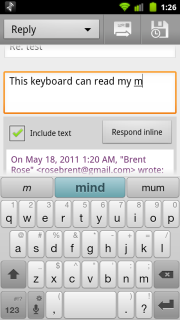
SwiftKey is one of the slick replacement keyboards available for Android. Keyboards Winner: Android rules this hard-fought category.
Security:
From a business standpoint, BlackBerry remains the gold standard in security. All of the operating systems have remote-wipe capabilities, can set unlock passwords, and can help you find a lost device, but BlackBerry has more end-to-end data encryption than the others--including encryption for removable storage.
Windows Phone 7 lags a bit, though more security features will come with Mango. It's worth noting that third-party iOS and Android apps often share more information than you would like, so read the permissions before you install. (For a more in-depth analysis, check out this PCWorld Business Center article on smartphone security.)
This may spark a call for my head on a platter from iPhone users, but hear me out. The iPhone 4 is fantastic, but it's only one phone--unless you want to count each previous incarnation. It may be perfect for you, but it's not for everybody.
This may spark a call for my head on a platter from iPhone users, but hear me out. The iPhone 4 is fantastic, but it's only one phone--unless you want to count each previous incarnation. It may be perfect for you, but it's not for everybody.
Android is on nearly 100 different models of smartphones. Some have big screens, others have little ones. Some have portrait, landscape, or touchscreen displays. Heck, some have two screens. You can find one that fits your needs. Android also has the jump on 4G LTE super speeds and NFC technology, though you can expect both to be pervasive across mobile OSs by year's end.
The few Windows Phone 7 handsets available are nice and offer several options. The variety will only increase when Nokia finally releases Windows Phone 7 devices--likely by early 2012.
BlackBerry keyboards are fantastic, and they make great "one-handed" devices, but RIM is scrambling to catch up in most respects since it's been making underpowered devices with low-resolution displays for too long. A number of recent leaks indicate that RIM will launch BlackBerry units with better screens and 1.2GHz processors by the end of the year, but with dual-core Androids already popping out, RIM may remain a step behind.
Hardware Options Winner: Android takes the hardware trophy.
Read more other business news : Toshiba pa3534u-1brs battery
Read more other business news : Toshiba pa3534u-1brs battery
Voice Controls:
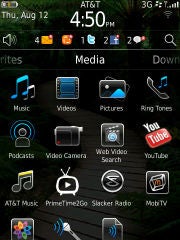
The somewhat revamped BlackBerry home screen in OS 6.Any mobile OS lets you call a contact by saying, "Call John Smith, mobile." iOS offers handy controls over the music player that the others lack. Android, however, lets you say things like, "Send text to John Smith, mobile, I'm running late but I'll be there soon (period). Want to order some starters (question mark)?" and you can send that text while hardly looking at your phone. Or you can say, "Directions to In 'n' Out Burger" to trigger Google Maps directions. Android also has excellent speech-to-text in any text entry field, helping you text while walking (not that we recommend doing so).
Voice Controls Winner: The other OSs get some of this extra functionality from third-party apps like Vlingo for BlackBerry, or Dragon Dictation for iOS, but they still don't offer the core functionality that Android does.
Options for IT Admins:
It all comes down to the preference of your IT admin and your company's device-management software. Excellent software exists for managing devices on any mobile OS, so admins can remotely wipe a smartphone, scan it for malware, and customize its software. Symantec Mobile Solutions, NotifyMDM, and Zenprise Mobile Manager already offer high-level support for BlackBerry, iOS, and Android, although currently only NotifyMDM supports Windows Phone 7.
BlackBerrys have been used for business for so long that most IT departments are already set up for them, plus the platform has added levels of security and encryption. iOS offers pretty decent encryption, too. Android and Windows Phone 7 need to catch up.
Winner: BlackBerry earns the IT medallion.
Maps and Navigation:
All four operating systems have built-in mapping software that works well and integrates into the OS. Android, however, has Google Maps and turn-by-turn directions that really work. I haven't had to look at a map once with Google's built-in Navigation app. For other OSs, you can buy third-party programs, many of them paid apps, that provide the same functionality, and Windows Phone 7 Mango will offer turn-by-turn directions free with Bing Maps.
Maps Winner: Android is the victor, turn by turn.
Read more other business news : dell inspiron 1720 battery
Read more other business news : dell inspiron 1720 battery
Interface Ease of Use:
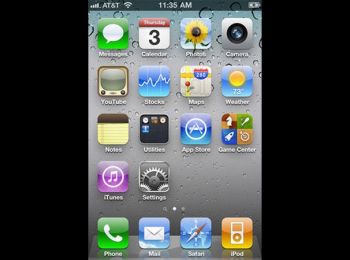
What a typical iOS home screen looks like.The iPhone was the first smartphone that didn't require a smart person to operate it. That's good, in that you'll be up and running quickly. Second place is a dead heat between Android and Windows Phone 7. Ten minutes of tinkering with either OS, and you should be well on your way. You may need the Live Tiles and "pinning" of Windows phones to be explained to you--not because they're complicated, just unique. For Android, you may need the notification pane explained to you, but then you'll love it. However, Android also has plenty of fragmentation, as it can look very different from device to device.
In last place is the BlackBerry OS. If you've ever used a BlackBerry in the past, its lack of intuitiveness won't matter because, ultimately, it hasn't changed that much. For those who are new to the brand, however, it will take some learning.
Winner: iOS wins for its simplicity, with Android just behind, and Windows Phone 7 nipping at the heels.
Interface Beauty:
Looks don't matter in the business world. Yeah, right. Even if we pretend that's true, what CEO wouldn't want the hottest-looking phone? Windows Phone 7 is sleek and sexy, with an almost-futuristic interface. iOS looks downright stodgy by comparison, Android looks disjointed, and BlackBerry just isn't exciting. The only thing that rivals Windows Phone 7 is the gorgeous third-party home replacement for Android, SPB Shell 3D--albeit that's really just your home screen. Again, though, Android's UI varies from phone to phone; the HTC Sense looks better than stock Android.
Looks Winner: Windows Phone 7 wins, hands down.
Customization:
Android at its core is open-source, so developers can get in deep, and you can customize. Don't like your keyboard? Download a different one. You can tweak the home screen with widgets, themes, and more.
iOS, on the other hand, looks mostly uniform. You can reshuffle the home screen's order of apps, add folders, and change your wallpaper, but that's about it. Apple almost prides itself on its lack of settings, so you don't have to think about them. To be fair, that's what many consumers are looking for--although it's maddening to those who crave customization.
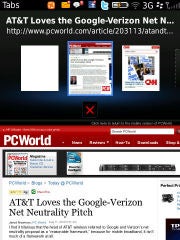
BlackBerry struts its tabbed browsing in OS 6. BlackBerry has decent customization, mostly by offering themes to give your home screen a new look. Windows Phone 7's home screen is fairly customizable, too, due to Live Tiles, but they don't integrate deeply (yet).
Customization Winner: This one is a blow-out: Android all the way.
Browser:
In general, the way Web pages render on iOS is eye-pleasing, fast, and smooth. Android's native browser is a step behind in how pages are rendered, but that evens out thanks to its Flash support. Steve Jobs may not like Adobe Flash, but thousands of extremely popular Websites use it. Because of the lack of Flash support on iOS, the Web experience on Android feels much more complete.
Windows Phone 7's nice browser is speedy, smooth, and renders Web pages nicely, but it still has a lot missing--namely, Flash and HTML5. (HTML5 support is slated to arrive in the Mango update, as are some new search features in Bing.)
BlackBerry's browser took a leap forward with OS 6. It's powered by WebKit (like the iOS and Android browsers), it finally has decent JavaScript performance, it has tabbed browsing, and it knows new tricks like touchscreen pinch-to-zoom. BlackBerry also compresses Websites on its servers before they reach your phone. Unfortunately, in other respects BlackBerry remains behind iOS and Android. Unless you're using one of the few BlackBerrys with a larger touchscreen--like the Torch or the Storm 2--you feel as if you're getting half a Web experience at best. Also, there's still no Flash support.
Browser Winner: iOS and Android tie for the win in browsers. Keep an eye on Windows Phone 7 after its Mango update, though.
What's Missing:
Every OS has missing goodies and at least one Achilles heel. With so many different Android handsets, manufacturers and carriers are slow to get the latest version of the OS onto their phones. Many phones slated for release later this year are still going to ship with Android 2.2 "Froyo," even though version 2.3 "Gingerbread" has been out since December. Google recently addressed the problem, and will require manufacturers to ensure that devices get software updates for 18 months after their release.
Read more other business news : dell latitude d620 battery
Read more other business news : dell latitude d620 battery
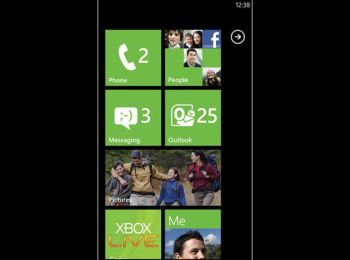
A typical Windows Phone 7 home screen shows Live Tiles feeding in information.Plus, the next major Android release, a.k.a., "Ice Cream Sandwich" will merge Honeycomb and Gingerbread. Other holes: Android needs a better media player, better integration with e-mail attachments, and a better native keyboard. (When will we see some Blind Type goodness?)
For iOS, where are the widgets? This is baffling, since Apple practically created the modern widget with its OS X dashboard. Also hurting iOS is how closed it is. Apple is notorious for booting apps out of the App Store, which translates to fewer options for consumers and less functionality. Also, I'd like to see options such as third-party keyboards or even replacement home screens. Flash support would be nice, too, as would integrated VoIP calling (which Android 2.3 supports).
For BlackBerry, the lack of quality apps is a major problem. Also, the interface is based on the old scroll-wheel OS, which makes no sense for the newer touchscreen devices. RIM will likely address these issues with its QNX-based OS (already out in the PlayBook tablet, and likely in BlackBerry 8). Also, BlackBerrys need better media handling, as well as syncing for nonenterprise users.
Windows Phone 7 is the new kid, so it's still missing bits and bolts, such as HTML5 and Flash. The biggest letdown, though, is a lack of multitasking with third-party apps. Windows Phone 7 also needs enhanced security features--ironic, since earlier Windows Mobile versions were security powerhouses. I'd also like to see options for third-party keyboards and an open file structure. Of the four OSs, Windows Phone 7 is the least complete. But it's a safe bet that Windows Phone 7 will be extremely competitive after the Mango update.
Who Wins the Title?
Which mobile operating system is the best, the undisputed winner? The answer, of course, is entirely subjective. However, because I place a high premium on customization, options, and versatility, Android is the clear champ in my ring.
That said, I owe no fealty to Google, and I've got a close eye on Windows Phone 7, which impresses with an attractive interface, speed, and a fantastic productivity suite. For users who just want something clean and simple with plenty of great apps, iOS is excellent. Workaholics will likely still lean towards BlackBerry, thanks to stellar e-mail and security.
Naturally, each OS is constantly evolving. By the end of this year we will see what's likely to be called Android 2.4, BlackBerry OS 7, iOS 5, and Windows Phone 7.1 Mango. Each is rumored to pack great improvements. BlackBerry OS 8--with no known release date--will likely be built by QNX, be faster and prettier, and may even run Android apps. That will likely help BlackBerry.
Ultimately, four companies constantly pushing each other is a big win for users, as competition drives innovation. When that innovation ends up in your pocket, I say let them keep duking it out.
Tagcloud : Android, BlackBerry, iOS, and Windows Phone 7 , Dell vostro 1520 battery , Dell vostro 1310 battery , Dell latitude e6400 battery
Tagcloud : Android, BlackBerry, iOS, and Windows Phone 7 , Dell vostro 1520 battery , Dell vostro 1310 battery , Dell latitude e6400 battery
No comments:
Post a Comment